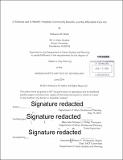In sickness and in wealth : hospitals, community benefits, and the Affordable Care Act
Author(s)
Mella, Katherine M. (Katherine Manuela)
DownloadFull printable version (20.60Mb)
Alternative title
Hospitals, community benefits, and the Affordable Care Act
Other Contributors
Massachusetts Institute of Technology. Department of Urban Studies and Planning.
Advisor
J. Phillip Thompson.
Terms of use
Metadata
Show full item recordAbstract
The new community benefit guidelines for non-profit hospitals enacted by the 2010 Patient Protection and Affordable Care Act (ACA) present major opportunities for the public health and planning fields alike. Given that social determinants-the economic and social conditions that affect our health-play a disproportionate role in shaping health outcomes, hospitals are in a unique position to broadly impact population health and community development by investing their benefit dollars in preventative and more meaningful activities. By updating the community benefit standard to include periodic health needs assessments with input from diverse community representatives; requiring an implementation strategy that outlines how hospitals will address identified health needs; and redesigning IRS Form 990 to include Schedule H to better capture hospitals' spending, the new guidelines have the potential to transform how hospitals allocate their community benefit resources. Massachusetts is one of several states that had implemented similar guidelines in line with the new ACA provisions. As such, this thesis focuses on Massachusetts General Hospital (MGH) as a case study to better understand the impact of the Attorney General's Voluntary Guidelines on its community benefit program, and, by extension, the health of MGH's three target communities: Charlestown, Chelsea, and Revere. The case study unveiled various findings, including the importance of community engagement and capacity building; the strength of the coalition model; and the integral role of collaboration in fostering successful and sustainable programs. Given the research conducted, this thesis outlines recommendations for more nuanced and well-defined community benefit guidelines. Its discussion concludes with further research considerations and an argument for the inclusion of "health in all policies," given the countless and inter-related factors that shape our health outcomes.
Description
Thesis: M.C.P., Massachusetts Institute of Technology, Department of Urban Studies and Planning, 2014. Cataloged from PDF version of thesis. Includes bibliographical references (pages 73-79).
Date issued
2014Department
Massachusetts Institute of Technology. Department of Urban Studies and PlanningPublisher
Massachusetts Institute of Technology
Keywords
Urban Studies and Planning.